Nursing Assignment: Literature Review on Healthy Ageing and Weight
VerifiedAdded on 2022/09/22
|9
|2557
|27
Literature Review
AI Summary
This literature review examines the critical topic of healthy ageing, focusing on the relationship between weight loss, obesity, and overall health in older adults. The review synthesizes various scholarly articles, highlighting the importance of interventions such as physical activity and calorie restriction to combat obesity and reduce the risk of age-related diseases. The author critically analyzes the strengths and weaknesses of the reviewed literature, emphasizing the need for further research on lifestyle interventions, specific training modalities, and long-term weight maintenance. The review underscores the prevalence of obesity among older adults and its adverse health outcomes, concluding that weight loss is essential for promoting healthy ageing and preventing chronic illnesses. The author suggests future research should focus on patient-centered outcomes and behavioral modifications tailored to older individuals.
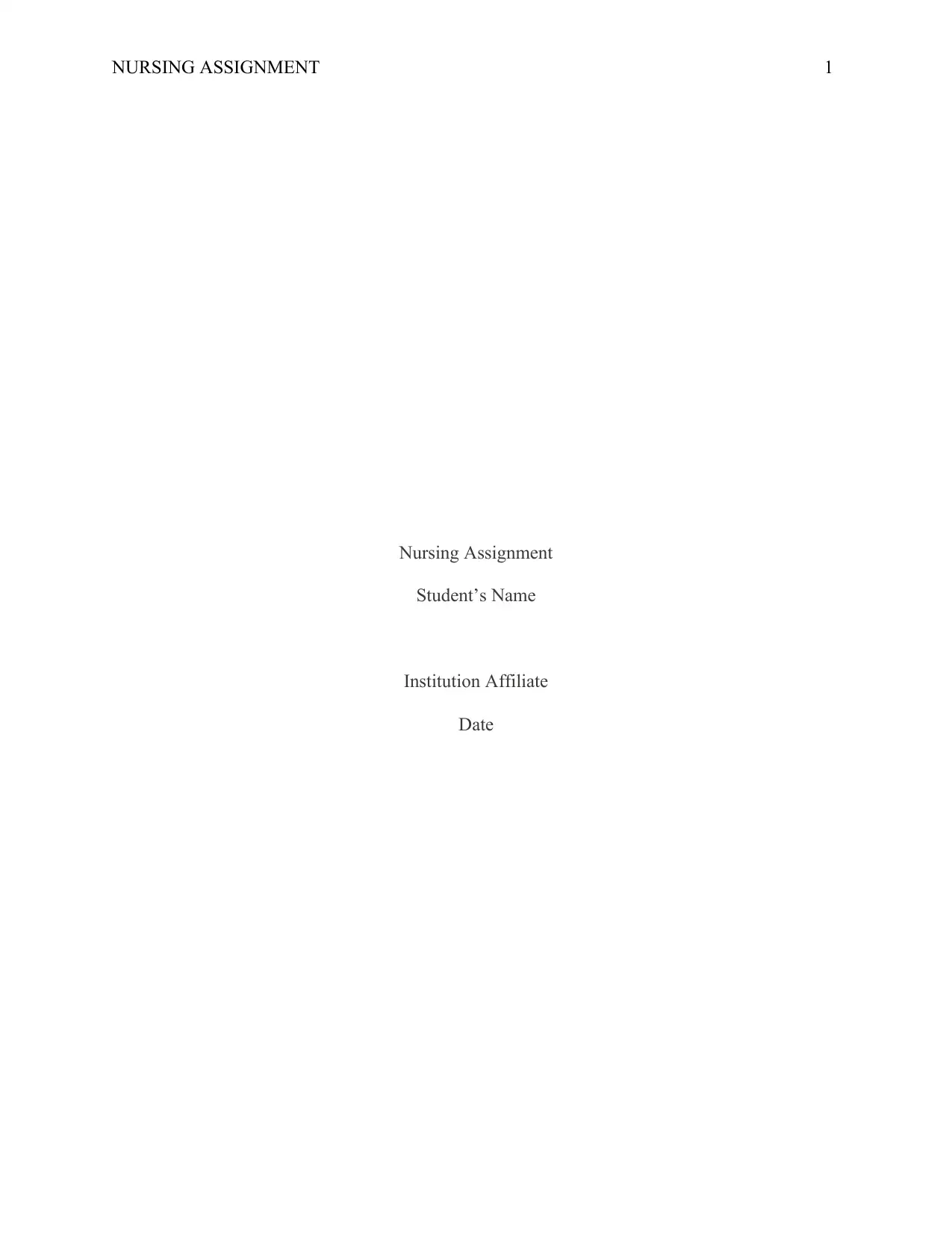
NURSING ASSIGNMENT 1
Nursing Assignment
Student’s Name
Institution Affiliate
Date
Nursing Assignment
Student’s Name
Institution Affiliate
Date
Paraphrase This Document
Need a fresh take? Get an instant paraphrase of this document with our AI Paraphraser
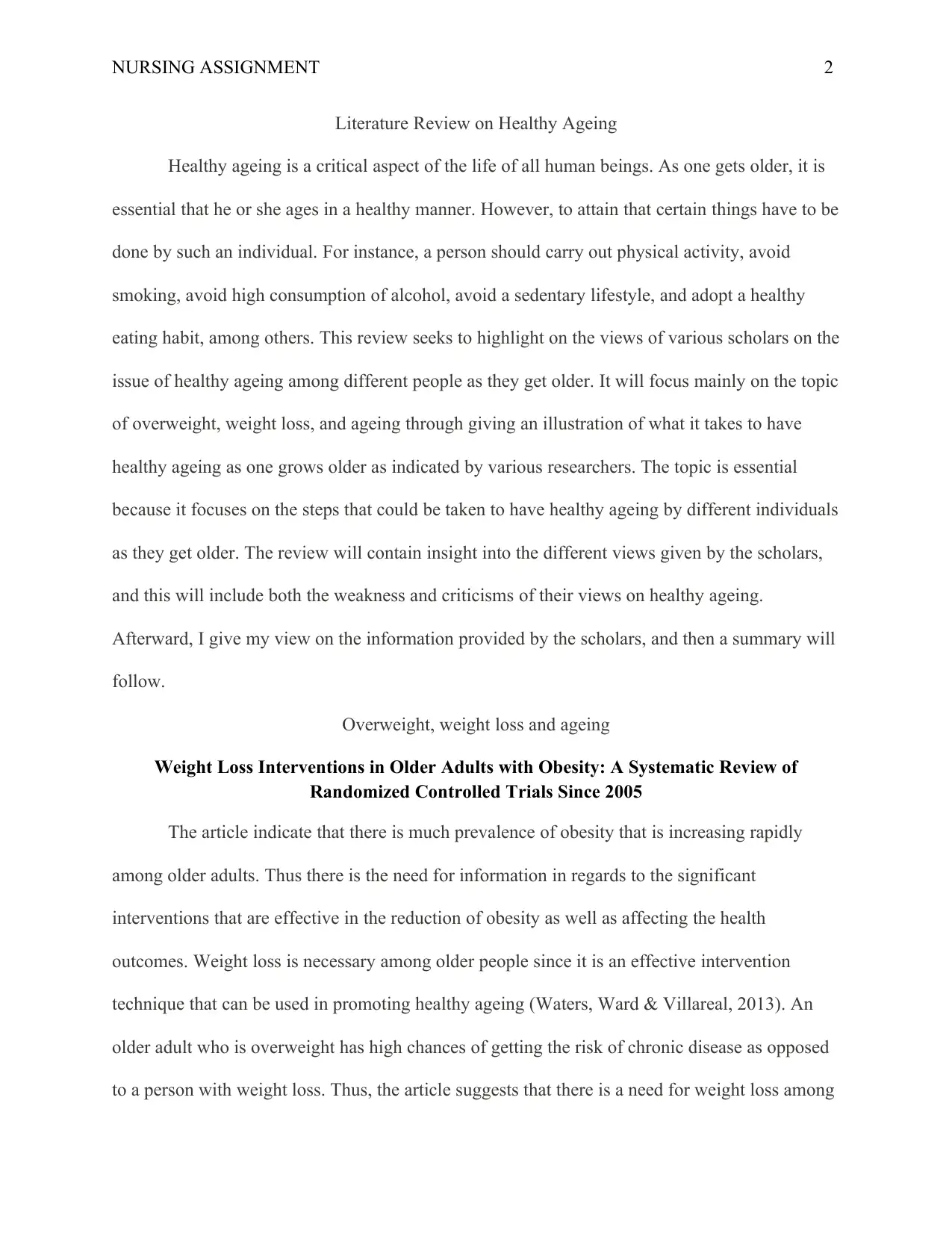
NURSING ASSIGNMENT 2
Literature Review on Healthy Ageing
Healthy ageing is a critical aspect of the life of all human beings. As one gets older, it is
essential that he or she ages in a healthy manner. However, to attain that certain things have to be
done by such an individual. For instance, a person should carry out physical activity, avoid
smoking, avoid high consumption of alcohol, avoid a sedentary lifestyle, and adopt a healthy
eating habit, among others. This review seeks to highlight on the views of various scholars on the
issue of healthy ageing among different people as they get older. It will focus mainly on the topic
of overweight, weight loss, and ageing through giving an illustration of what it takes to have
healthy ageing as one grows older as indicated by various researchers. The topic is essential
because it focuses on the steps that could be taken to have healthy ageing by different individuals
as they get older. The review will contain insight into the different views given by the scholars,
and this will include both the weakness and criticisms of their views on healthy ageing.
Afterward, I give my view on the information provided by the scholars, and then a summary will
follow.
Overweight, weight loss and ageing
Weight Loss Interventions in Older Adults with Obesity: A Systematic Review of
Randomized Controlled Trials Since 2005
The article indicate that there is much prevalence of obesity that is increasing rapidly
among older adults. Thus there is the need for information in regards to the significant
interventions that are effective in the reduction of obesity as well as affecting the health
outcomes. Weight loss is necessary among older people since it is an effective intervention
technique that can be used in promoting healthy ageing (Waters, Ward & Villareal, 2013). An
older adult who is overweight has high chances of getting the risk of chronic disease as opposed
to a person with weight loss. Thus, the article suggests that there is a need for weight loss among
Literature Review on Healthy Ageing
Healthy ageing is a critical aspect of the life of all human beings. As one gets older, it is
essential that he or she ages in a healthy manner. However, to attain that certain things have to be
done by such an individual. For instance, a person should carry out physical activity, avoid
smoking, avoid high consumption of alcohol, avoid a sedentary lifestyle, and adopt a healthy
eating habit, among others. This review seeks to highlight on the views of various scholars on the
issue of healthy ageing among different people as they get older. It will focus mainly on the topic
of overweight, weight loss, and ageing through giving an illustration of what it takes to have
healthy ageing as one grows older as indicated by various researchers. The topic is essential
because it focuses on the steps that could be taken to have healthy ageing by different individuals
as they get older. The review will contain insight into the different views given by the scholars,
and this will include both the weakness and criticisms of their views on healthy ageing.
Afterward, I give my view on the information provided by the scholars, and then a summary will
follow.
Overweight, weight loss and ageing
Weight Loss Interventions in Older Adults with Obesity: A Systematic Review of
Randomized Controlled Trials Since 2005
The article indicate that there is much prevalence of obesity that is increasing rapidly
among older adults. Thus there is the need for information in regards to the significant
interventions that are effective in the reduction of obesity as well as affecting the health
outcomes. Weight loss is necessary among older people since it is an effective intervention
technique that can be used in promoting healthy ageing (Waters, Ward & Villareal, 2013). An
older adult who is overweight has high chances of getting the risk of chronic disease as opposed
to a person with weight loss. Thus, the article suggests that there is a need for weight loss among
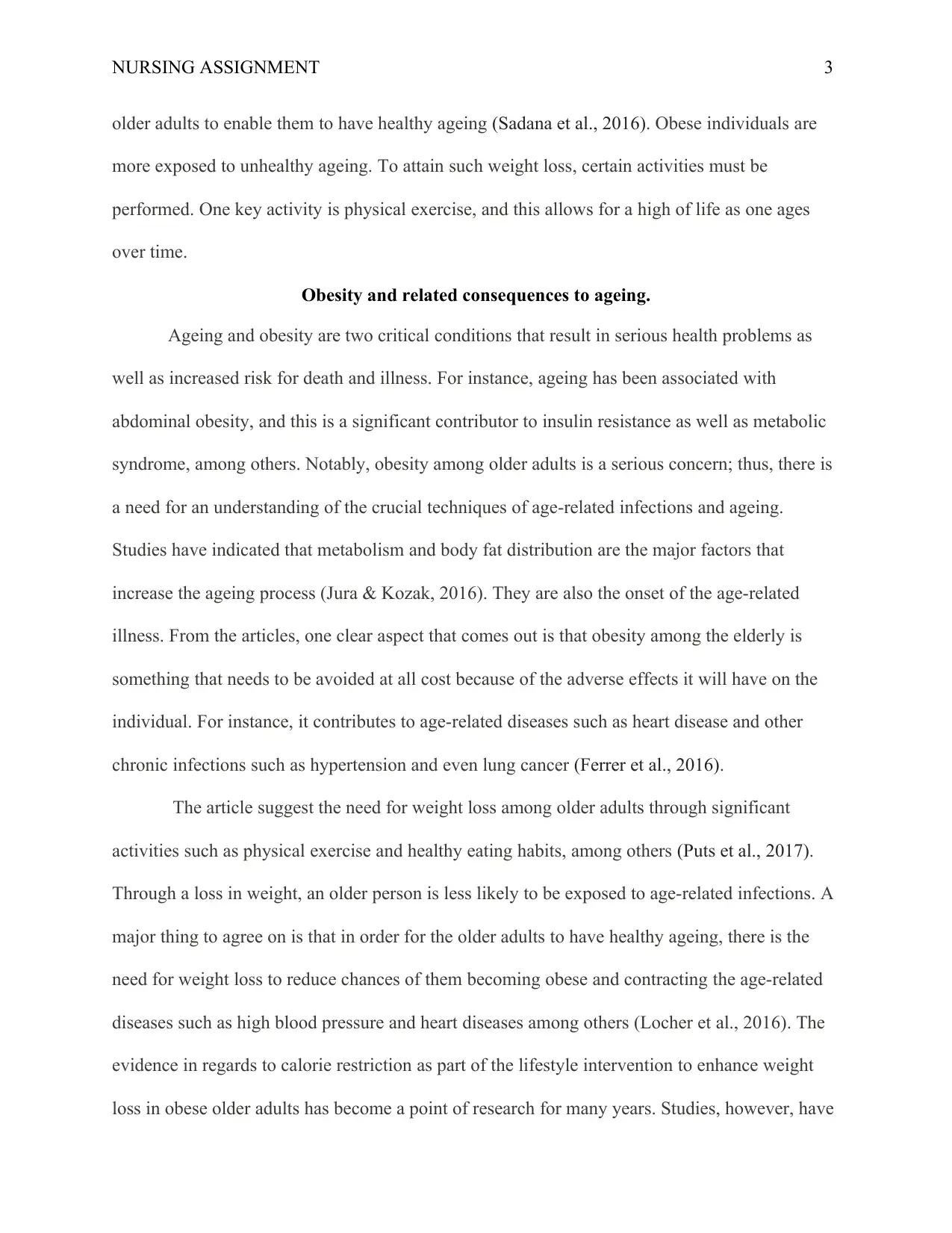
NURSING ASSIGNMENT 3
older adults to enable them to have healthy ageing (Sadana et al., 2016). Obese individuals are
more exposed to unhealthy ageing. To attain such weight loss, certain activities must be
performed. One key activity is physical exercise, and this allows for a high of life as one ages
over time.
Obesity and related consequences to ageing.
Ageing and obesity are two critical conditions that result in serious health problems as
well as increased risk for death and illness. For instance, ageing has been associated with
abdominal obesity, and this is a significant contributor to insulin resistance as well as metabolic
syndrome, among others. Notably, obesity among older adults is a serious concern; thus, there is
a need for an understanding of the crucial techniques of age-related infections and ageing.
Studies have indicated that metabolism and body fat distribution are the major factors that
increase the ageing process (Jura & Kozak, 2016). They are also the onset of the age-related
illness. From the articles, one clear aspect that comes out is that obesity among the elderly is
something that needs to be avoided at all cost because of the adverse effects it will have on the
individual. For instance, it contributes to age-related diseases such as heart disease and other
chronic infections such as hypertension and even lung cancer (Ferrer et al., 2016).
The article suggest the need for weight loss among older adults through significant
activities such as physical exercise and healthy eating habits, among others (Puts et al., 2017).
Through a loss in weight, an older person is less likely to be exposed to age-related infections. A
major thing to agree on is that in order for the older adults to have healthy ageing, there is the
need for weight loss to reduce chances of them becoming obese and contracting the age-related
diseases such as high blood pressure and heart diseases among others (Locher et al., 2016). The
evidence in regards to calorie restriction as part of the lifestyle intervention to enhance weight
loss in obese older adults has become a point of research for many years. Studies, however, have
older adults to enable them to have healthy ageing (Sadana et al., 2016). Obese individuals are
more exposed to unhealthy ageing. To attain such weight loss, certain activities must be
performed. One key activity is physical exercise, and this allows for a high of life as one ages
over time.
Obesity and related consequences to ageing.
Ageing and obesity are two critical conditions that result in serious health problems as
well as increased risk for death and illness. For instance, ageing has been associated with
abdominal obesity, and this is a significant contributor to insulin resistance as well as metabolic
syndrome, among others. Notably, obesity among older adults is a serious concern; thus, there is
a need for an understanding of the crucial techniques of age-related infections and ageing.
Studies have indicated that metabolism and body fat distribution are the major factors that
increase the ageing process (Jura & Kozak, 2016). They are also the onset of the age-related
illness. From the articles, one clear aspect that comes out is that obesity among the elderly is
something that needs to be avoided at all cost because of the adverse effects it will have on the
individual. For instance, it contributes to age-related diseases such as heart disease and other
chronic infections such as hypertension and even lung cancer (Ferrer et al., 2016).
The article suggest the need for weight loss among older adults through significant
activities such as physical exercise and healthy eating habits, among others (Puts et al., 2017).
Through a loss in weight, an older person is less likely to be exposed to age-related infections. A
major thing to agree on is that in order for the older adults to have healthy ageing, there is the
need for weight loss to reduce chances of them becoming obese and contracting the age-related
diseases such as high blood pressure and heart diseases among others (Locher et al., 2016). The
evidence in regards to calorie restriction as part of the lifestyle intervention to enhance weight
loss in obese older adults has become a point of research for many years. Studies, however, have
⊘ This is a preview!⊘
Do you want full access?
Subscribe today to unlock all pages.

Trusted by 1+ million students worldwide
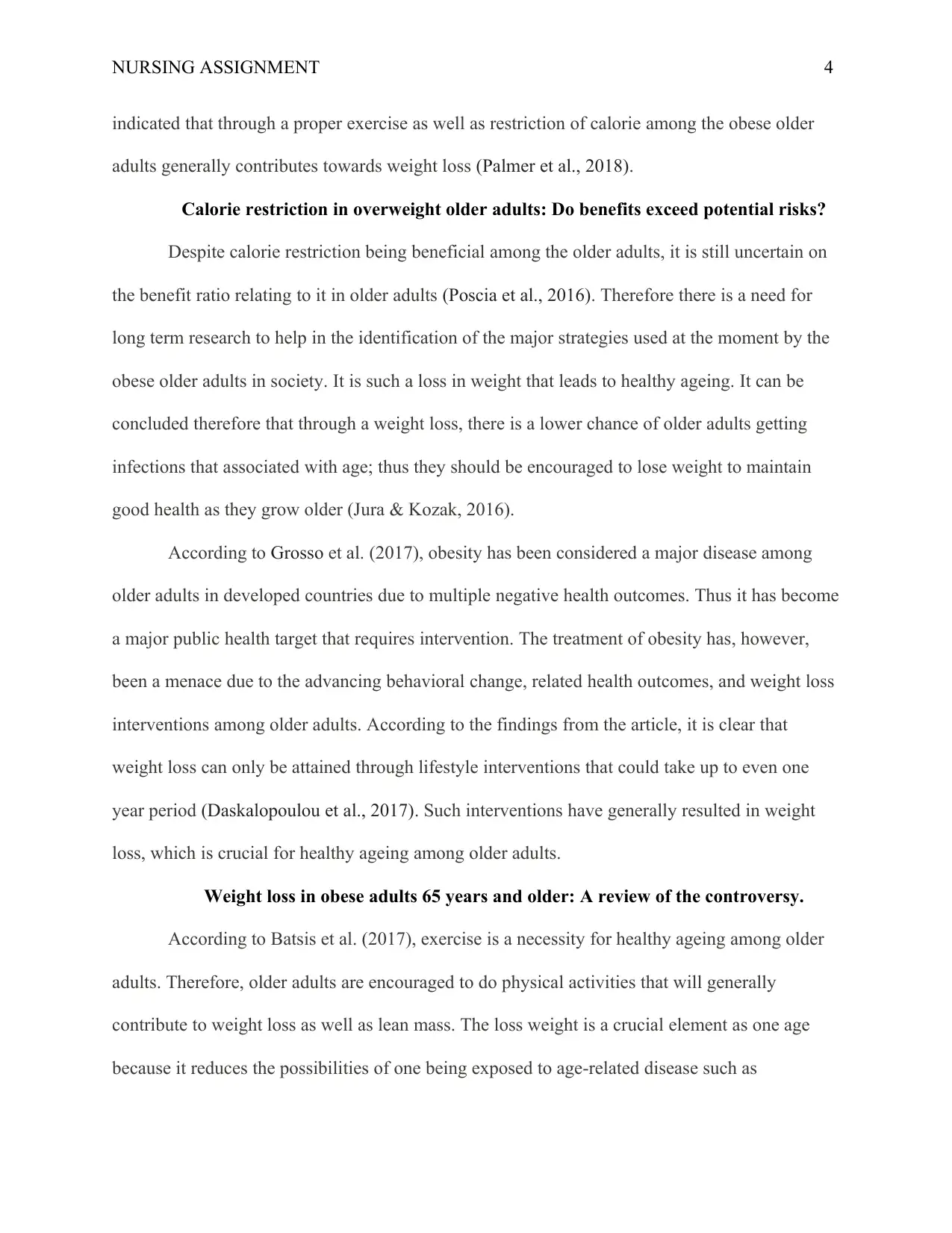
NURSING ASSIGNMENT 4
indicated that through a proper exercise as well as restriction of calorie among the obese older
adults generally contributes towards weight loss (Palmer et al., 2018).
Calorie restriction in overweight older adults: Do benefits exceed potential risks?
Despite calorie restriction being beneficial among the older adults, it is still uncertain on
the benefit ratio relating to it in older adults (Poscia et al., 2016). Therefore there is a need for
long term research to help in the identification of the major strategies used at the moment by the
obese older adults in society. It is such a loss in weight that leads to healthy ageing. It can be
concluded therefore that through a weight loss, there is a lower chance of older adults getting
infections that associated with age; thus they should be encouraged to lose weight to maintain
good health as they grow older (Jura & Kozak, 2016).
According to Grosso et al. (2017), obesity has been considered a major disease among
older adults in developed countries due to multiple negative health outcomes. Thus it has become
a major public health target that requires intervention. The treatment of obesity has, however,
been a menace due to the advancing behavioral change, related health outcomes, and weight loss
interventions among older adults. According to the findings from the article, it is clear that
weight loss can only be attained through lifestyle interventions that could take up to even one
year period (Daskalopoulou et al., 2017). Such interventions have generally resulted in weight
loss, which is crucial for healthy ageing among older adults.
Weight loss in obese adults 65 years and older: A review of the controversy.
According to Batsis et al. (2017), exercise is a necessity for healthy ageing among older
adults. Therefore, older adults are encouraged to do physical activities that will generally
contribute to weight loss as well as lean mass. The loss weight is a crucial element as one age
because it reduces the possibilities of one being exposed to age-related disease such as
indicated that through a proper exercise as well as restriction of calorie among the obese older
adults generally contributes towards weight loss (Palmer et al., 2018).
Calorie restriction in overweight older adults: Do benefits exceed potential risks?
Despite calorie restriction being beneficial among the older adults, it is still uncertain on
the benefit ratio relating to it in older adults (Poscia et al., 2016). Therefore there is a need for
long term research to help in the identification of the major strategies used at the moment by the
obese older adults in society. It is such a loss in weight that leads to healthy ageing. It can be
concluded therefore that through a weight loss, there is a lower chance of older adults getting
infections that associated with age; thus they should be encouraged to lose weight to maintain
good health as they grow older (Jura & Kozak, 2016).
According to Grosso et al. (2017), obesity has been considered a major disease among
older adults in developed countries due to multiple negative health outcomes. Thus it has become
a major public health target that requires intervention. The treatment of obesity has, however,
been a menace due to the advancing behavioral change, related health outcomes, and weight loss
interventions among older adults. According to the findings from the article, it is clear that
weight loss can only be attained through lifestyle interventions that could take up to even one
year period (Daskalopoulou et al., 2017). Such interventions have generally resulted in weight
loss, which is crucial for healthy ageing among older adults.
Weight loss in obese adults 65 years and older: A review of the controversy.
According to Batsis et al. (2017), exercise is a necessity for healthy ageing among older
adults. Therefore, older adults are encouraged to do physical activities that will generally
contribute to weight loss as well as lean mass. The loss weight is a crucial element as one age
because it reduces the possibilities of one being exposed to age-related disease such as
Paraphrase This Document
Need a fresh take? Get an instant paraphrase of this document with our AI Paraphraser
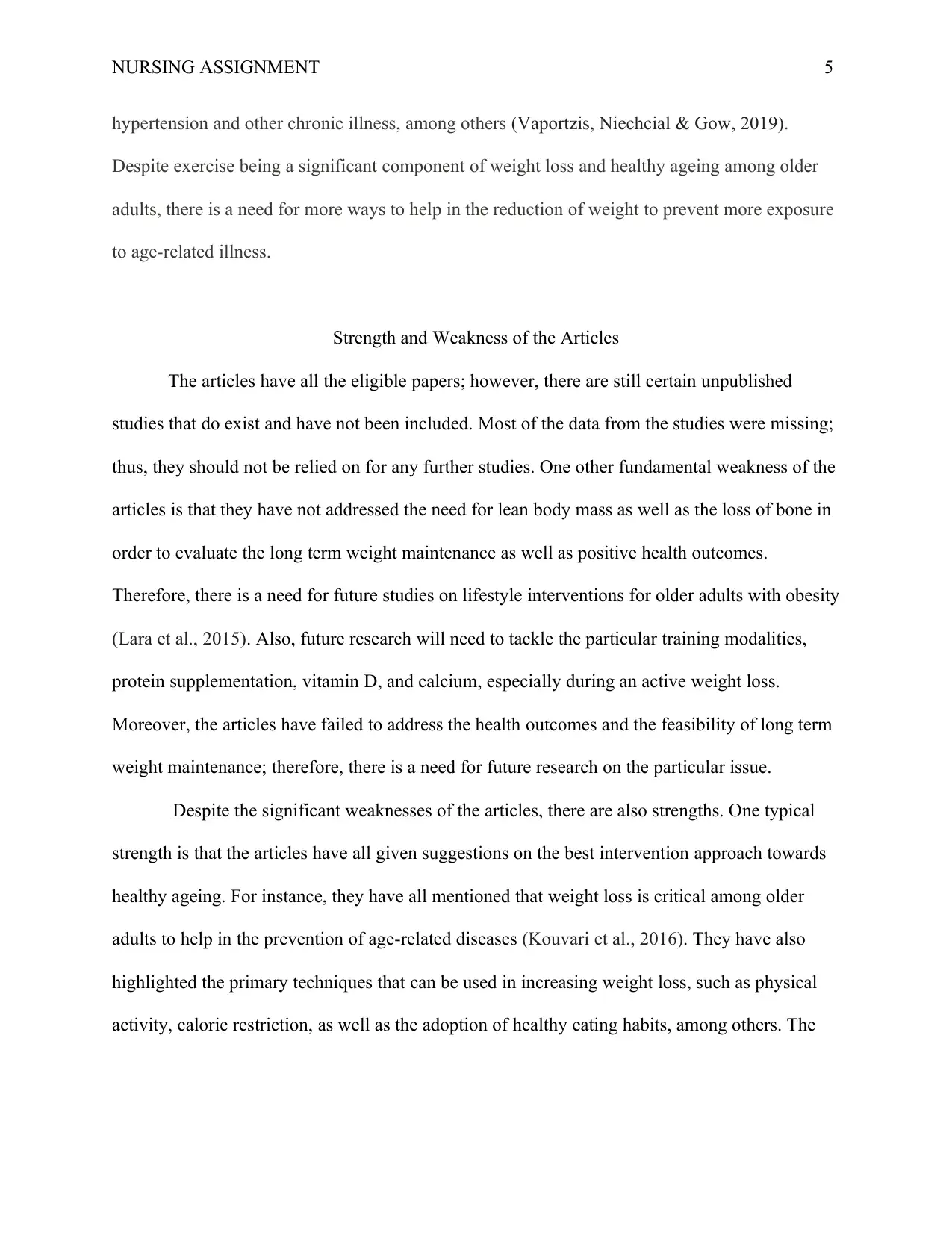
NURSING ASSIGNMENT 5
hypertension and other chronic illness, among others (Vaportzis, Niechcial & Gow, 2019).
Despite exercise being a significant component of weight loss and healthy ageing among older
adults, there is a need for more ways to help in the reduction of weight to prevent more exposure
to age-related illness.
Strength and Weakness of the Articles
The articles have all the eligible papers; however, there are still certain unpublished
studies that do exist and have not been included. Most of the data from the studies were missing;
thus, they should not be relied on for any further studies. One other fundamental weakness of the
articles is that they have not addressed the need for lean body mass as well as the loss of bone in
order to evaluate the long term weight maintenance as well as positive health outcomes.
Therefore, there is a need for future studies on lifestyle interventions for older adults with obesity
(Lara et al., 2015). Also, future research will need to tackle the particular training modalities,
protein supplementation, vitamin D, and calcium, especially during an active weight loss.
Moreover, the articles have failed to address the health outcomes and the feasibility of long term
weight maintenance; therefore, there is a need for future research on the particular issue.
Despite the significant weaknesses of the articles, there are also strengths. One typical
strength is that the articles have all given suggestions on the best intervention approach towards
healthy ageing. For instance, they have all mentioned that weight loss is critical among older
adults to help in the prevention of age-related diseases (Kouvari et al., 2016). They have also
highlighted the primary techniques that can be used in increasing weight loss, such as physical
activity, calorie restriction, as well as the adoption of healthy eating habits, among others. The
hypertension and other chronic illness, among others (Vaportzis, Niechcial & Gow, 2019).
Despite exercise being a significant component of weight loss and healthy ageing among older
adults, there is a need for more ways to help in the reduction of weight to prevent more exposure
to age-related illness.
Strength and Weakness of the Articles
The articles have all the eligible papers; however, there are still certain unpublished
studies that do exist and have not been included. Most of the data from the studies were missing;
thus, they should not be relied on for any further studies. One other fundamental weakness of the
articles is that they have not addressed the need for lean body mass as well as the loss of bone in
order to evaluate the long term weight maintenance as well as positive health outcomes.
Therefore, there is a need for future studies on lifestyle interventions for older adults with obesity
(Lara et al., 2015). Also, future research will need to tackle the particular training modalities,
protein supplementation, vitamin D, and calcium, especially during an active weight loss.
Moreover, the articles have failed to address the health outcomes and the feasibility of long term
weight maintenance; therefore, there is a need for future research on the particular issue.
Despite the significant weaknesses of the articles, there are also strengths. One typical
strength is that the articles have all given suggestions on the best intervention approach towards
healthy ageing. For instance, they have all mentioned that weight loss is critical among older
adults to help in the prevention of age-related diseases (Kouvari et al., 2016). They have also
highlighted the primary techniques that can be used in increasing weight loss, such as physical
activity, calorie restriction, as well as the adoption of healthy eating habits, among others. The
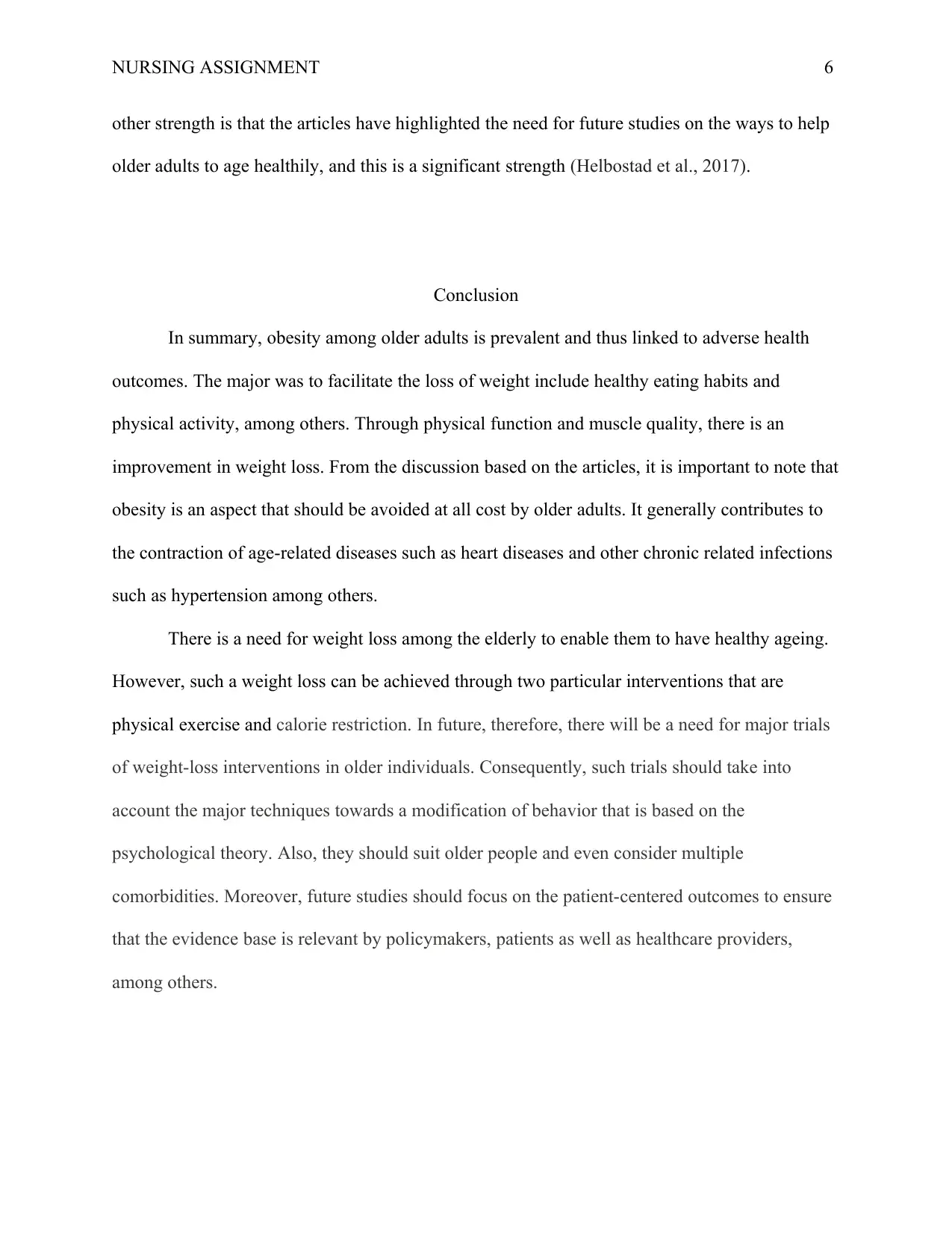
NURSING ASSIGNMENT 6
other strength is that the articles have highlighted the need for future studies on the ways to help
older adults to age healthily, and this is a significant strength (Helbostad et al., 2017).
Conclusion
In summary, obesity among older adults is prevalent and thus linked to adverse health
outcomes. The major was to facilitate the loss of weight include healthy eating habits and
physical activity, among others. Through physical function and muscle quality, there is an
improvement in weight loss. From the discussion based on the articles, it is important to note that
obesity is an aspect that should be avoided at all cost by older adults. It generally contributes to
the contraction of age-related diseases such as heart diseases and other chronic related infections
such as hypertension among others.
There is a need for weight loss among the elderly to enable them to have healthy ageing.
However, such a weight loss can be achieved through two particular interventions that are
physical exercise and calorie restriction. In future, therefore, there will be a need for major trials
of weight-loss interventions in older individuals. Consequently, such trials should take into
account the major techniques towards a modification of behavior that is based on the
psychological theory. Also, they should suit older people and even consider multiple
comorbidities. Moreover, future studies should focus on the patient-centered outcomes to ensure
that the evidence base is relevant by policymakers, patients as well as healthcare providers,
among others.
other strength is that the articles have highlighted the need for future studies on the ways to help
older adults to age healthily, and this is a significant strength (Helbostad et al., 2017).
Conclusion
In summary, obesity among older adults is prevalent and thus linked to adverse health
outcomes. The major was to facilitate the loss of weight include healthy eating habits and
physical activity, among others. Through physical function and muscle quality, there is an
improvement in weight loss. From the discussion based on the articles, it is important to note that
obesity is an aspect that should be avoided at all cost by older adults. It generally contributes to
the contraction of age-related diseases such as heart diseases and other chronic related infections
such as hypertension among others.
There is a need for weight loss among the elderly to enable them to have healthy ageing.
However, such a weight loss can be achieved through two particular interventions that are
physical exercise and calorie restriction. In future, therefore, there will be a need for major trials
of weight-loss interventions in older individuals. Consequently, such trials should take into
account the major techniques towards a modification of behavior that is based on the
psychological theory. Also, they should suit older people and even consider multiple
comorbidities. Moreover, future studies should focus on the patient-centered outcomes to ensure
that the evidence base is relevant by policymakers, patients as well as healthcare providers,
among others.
⊘ This is a preview!⊘
Do you want full access?
Subscribe today to unlock all pages.

Trusted by 1+ million students worldwide
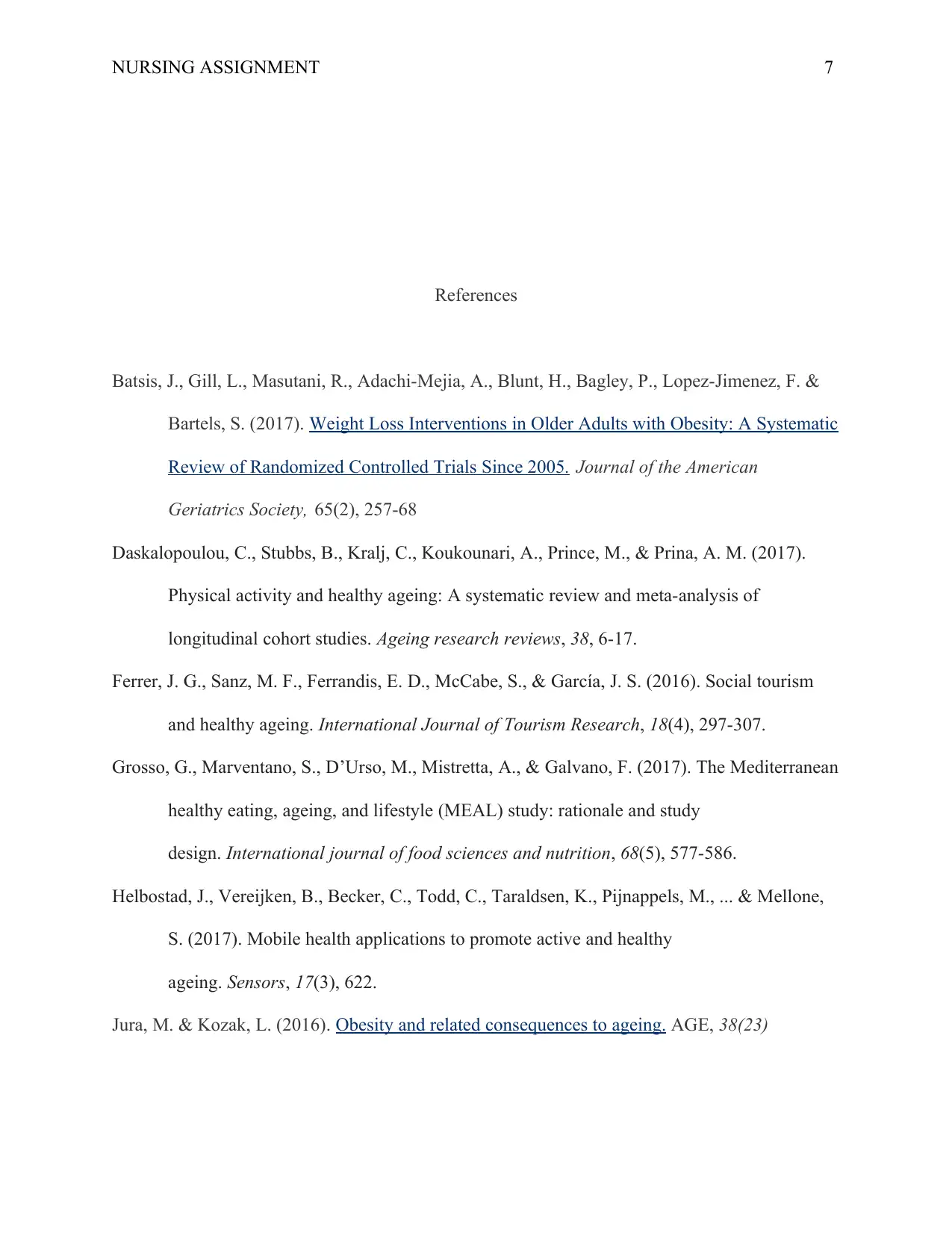
NURSING ASSIGNMENT 7
References
Batsis, J., Gill, L., Masutani, R., Adachi-Mejia, A., Blunt, H., Bagley, P., Lopez-Jimenez, F. &
Bartels, S. (2017). Weight Loss Interventions in Older Adults with Obesity: A Systematic
Review of Randomized Controlled Trials Since 2005. Journal of the American
Geriatrics Society, 65(2), 257-68
Daskalopoulou, C., Stubbs, B., Kralj, C., Koukounari, A., Prince, M., & Prina, A. M. (2017).
Physical activity and healthy ageing: A systematic review and meta-analysis of
longitudinal cohort studies. Ageing research reviews, 38, 6-17.
Ferrer, J. G., Sanz, M. F., Ferrandis, E. D., McCabe, S., & García, J. S. (2016). Social tourism
and healthy ageing. International Journal of Tourism Research, 18(4), 297-307.
Grosso, G., Marventano, S., D’Urso, M., Mistretta, A., & Galvano, F. (2017). The Mediterranean
healthy eating, ageing, and lifestyle (MEAL) study: rationale and study
design. International journal of food sciences and nutrition, 68(5), 577-586.
Helbostad, J., Vereijken, B., Becker, C., Todd, C., Taraldsen, K., Pijnappels, M., ... & Mellone,
S. (2017). Mobile health applications to promote active and healthy
ageing. Sensors, 17(3), 622.
Jura, M. & Kozak, L. (2016). Obesity and related consequences to ageing. AGE, 38(23)
References
Batsis, J., Gill, L., Masutani, R., Adachi-Mejia, A., Blunt, H., Bagley, P., Lopez-Jimenez, F. &
Bartels, S. (2017). Weight Loss Interventions in Older Adults with Obesity: A Systematic
Review of Randomized Controlled Trials Since 2005. Journal of the American
Geriatrics Society, 65(2), 257-68
Daskalopoulou, C., Stubbs, B., Kralj, C., Koukounari, A., Prince, M., & Prina, A. M. (2017).
Physical activity and healthy ageing: A systematic review and meta-analysis of
longitudinal cohort studies. Ageing research reviews, 38, 6-17.
Ferrer, J. G., Sanz, M. F., Ferrandis, E. D., McCabe, S., & García, J. S. (2016). Social tourism
and healthy ageing. International Journal of Tourism Research, 18(4), 297-307.
Grosso, G., Marventano, S., D’Urso, M., Mistretta, A., & Galvano, F. (2017). The Mediterranean
healthy eating, ageing, and lifestyle (MEAL) study: rationale and study
design. International journal of food sciences and nutrition, 68(5), 577-586.
Helbostad, J., Vereijken, B., Becker, C., Todd, C., Taraldsen, K., Pijnappels, M., ... & Mellone,
S. (2017). Mobile health applications to promote active and healthy
ageing. Sensors, 17(3), 622.
Jura, M. & Kozak, L. (2016). Obesity and related consequences to ageing. AGE, 38(23)
Paraphrase This Document
Need a fresh take? Get an instant paraphrase of this document with our AI Paraphraser
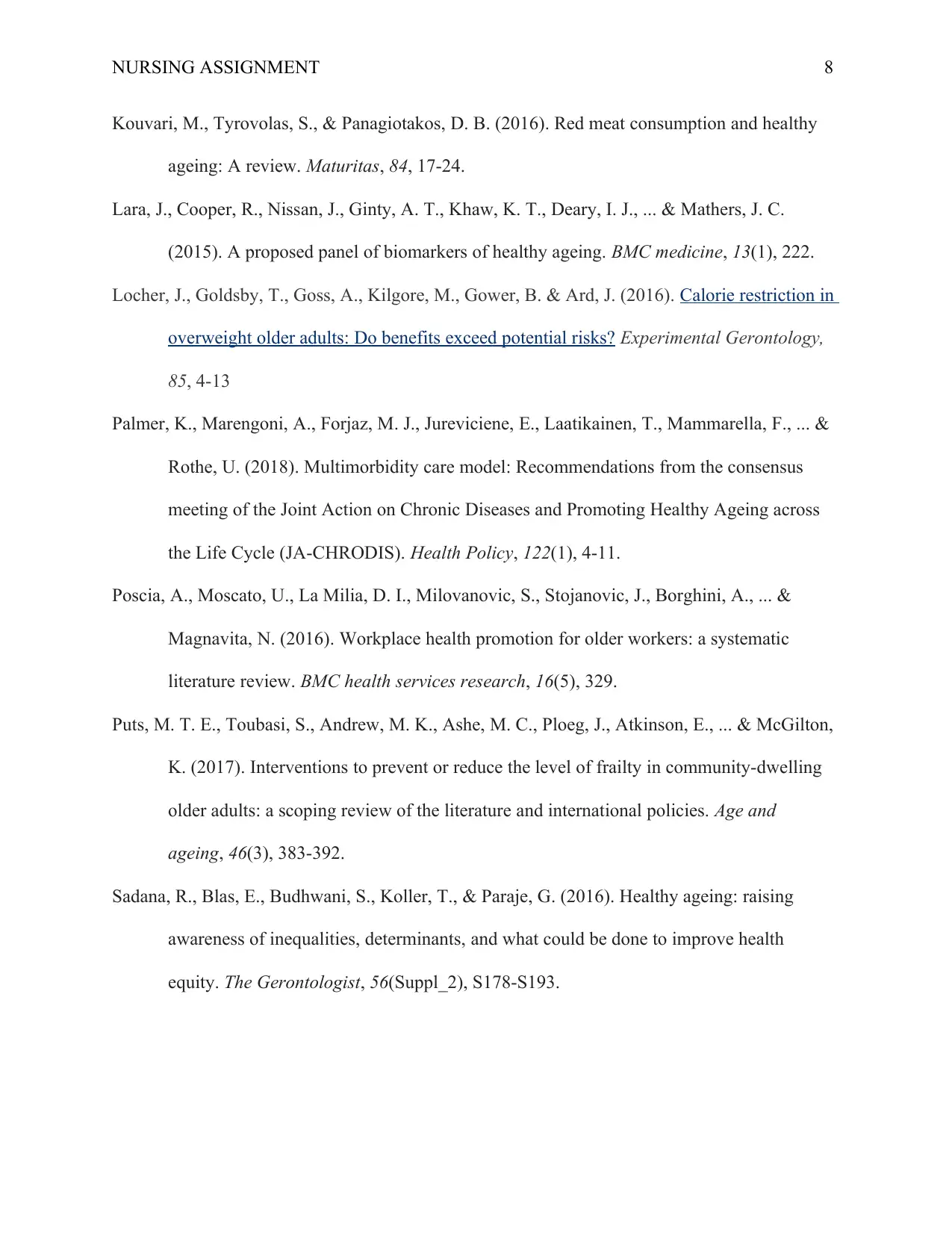
NURSING ASSIGNMENT 8
Kouvari, M., Tyrovolas, S., & Panagiotakos, D. B. (2016). Red meat consumption and healthy
ageing: A review. Maturitas, 84, 17-24.
Lara, J., Cooper, R., Nissan, J., Ginty, A. T., Khaw, K. T., Deary, I. J., ... & Mathers, J. C.
(2015). A proposed panel of biomarkers of healthy ageing. BMC medicine, 13(1), 222.
Locher, J., Goldsby, T., Goss, A., Kilgore, M., Gower, B. & Ard, J. (2016). Calorie restriction in
overweight older adults: Do benefits exceed potential risks? Experimental Gerontology,
85, 4-13
Palmer, K., Marengoni, A., Forjaz, M. J., Jureviciene, E., Laatikainen, T., Mammarella, F., ... &
Rothe, U. (2018). Multimorbidity care model: Recommendations from the consensus
meeting of the Joint Action on Chronic Diseases and Promoting Healthy Ageing across
the Life Cycle (JA-CHRODIS). Health Policy, 122(1), 4-11.
Poscia, A., Moscato, U., La Milia, D. I., Milovanovic, S., Stojanovic, J., Borghini, A., ... &
Magnavita, N. (2016). Workplace health promotion for older workers: a systematic
literature review. BMC health services research, 16(5), 329.
Puts, M. T. E., Toubasi, S., Andrew, M. K., Ashe, M. C., Ploeg, J., Atkinson, E., ... & McGilton,
K. (2017). Interventions to prevent or reduce the level of frailty in community-dwelling
older adults: a scoping review of the literature and international policies. Age and
ageing, 46(3), 383-392.
Sadana, R., Blas, E., Budhwani, S., Koller, T., & Paraje, G. (2016). Healthy ageing: raising
awareness of inequalities, determinants, and what could be done to improve health
equity. The Gerontologist, 56(Suppl_2), S178-S193.
Kouvari, M., Tyrovolas, S., & Panagiotakos, D. B. (2016). Red meat consumption and healthy
ageing: A review. Maturitas, 84, 17-24.
Lara, J., Cooper, R., Nissan, J., Ginty, A. T., Khaw, K. T., Deary, I. J., ... & Mathers, J. C.
(2015). A proposed panel of biomarkers of healthy ageing. BMC medicine, 13(1), 222.
Locher, J., Goldsby, T., Goss, A., Kilgore, M., Gower, B. & Ard, J. (2016). Calorie restriction in
overweight older adults: Do benefits exceed potential risks? Experimental Gerontology,
85, 4-13
Palmer, K., Marengoni, A., Forjaz, M. J., Jureviciene, E., Laatikainen, T., Mammarella, F., ... &
Rothe, U. (2018). Multimorbidity care model: Recommendations from the consensus
meeting of the Joint Action on Chronic Diseases and Promoting Healthy Ageing across
the Life Cycle (JA-CHRODIS). Health Policy, 122(1), 4-11.
Poscia, A., Moscato, U., La Milia, D. I., Milovanovic, S., Stojanovic, J., Borghini, A., ... &
Magnavita, N. (2016). Workplace health promotion for older workers: a systematic
literature review. BMC health services research, 16(5), 329.
Puts, M. T. E., Toubasi, S., Andrew, M. K., Ashe, M. C., Ploeg, J., Atkinson, E., ... & McGilton,
K. (2017). Interventions to prevent or reduce the level of frailty in community-dwelling
older adults: a scoping review of the literature and international policies. Age and
ageing, 46(3), 383-392.
Sadana, R., Blas, E., Budhwani, S., Koller, T., & Paraje, G. (2016). Healthy ageing: raising
awareness of inequalities, determinants, and what could be done to improve health
equity. The Gerontologist, 56(Suppl_2), S178-S193.
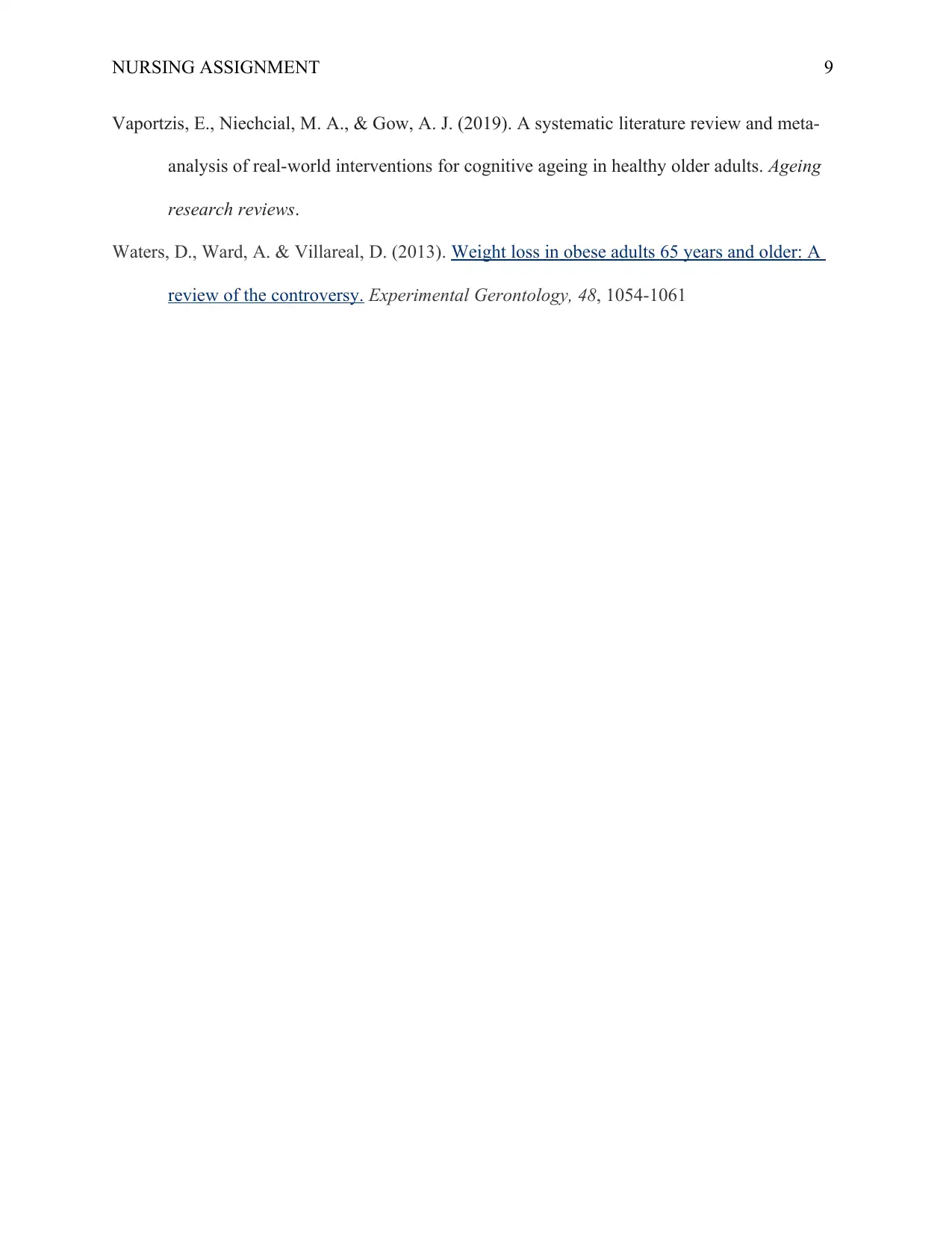
NURSING ASSIGNMENT 9
Vaportzis, E., Niechcial, M. A., & Gow, A. J. (2019). A systematic literature review and meta-
analysis of real-world interventions for cognitive ageing in healthy older adults. Ageing
research reviews.
Waters, D., Ward, A. & Villareal, D. (2013). Weight loss in obese adults 65 years and older: A
review of the controversy. Experimental Gerontology, 48, 1054-1061
Vaportzis, E., Niechcial, M. A., & Gow, A. J. (2019). A systematic literature review and meta-
analysis of real-world interventions for cognitive ageing in healthy older adults. Ageing
research reviews.
Waters, D., Ward, A. & Villareal, D. (2013). Weight loss in obese adults 65 years and older: A
review of the controversy. Experimental Gerontology, 48, 1054-1061
⊘ This is a preview!⊘
Do you want full access?
Subscribe today to unlock all pages.

Trusted by 1+ million students worldwide
1 out of 9
Related Documents
Your All-in-One AI-Powered Toolkit for Academic Success.
+13062052269
info@desklib.com
Available 24*7 on WhatsApp / Email
![[object Object]](/_next/static/media/star-bottom.7253800d.svg)
Unlock your academic potential
Copyright © 2020–2025 A2Z Services. All Rights Reserved. Developed and managed by ZUCOL.





